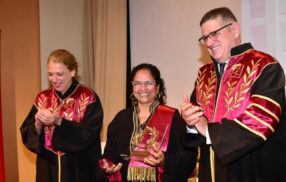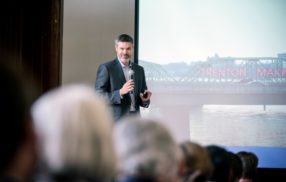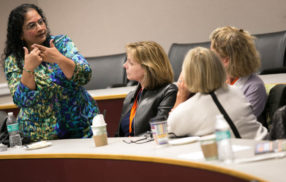
Entrepreneurship on the Inside: UVA Darden Growth Catalysts Innovate Within Big Business
By Dave Hendrick
This isn’t a story about entrepreneurship. It’s a story about the power of entrepreneurial thinking and a bias for action that University of Virginia Darden School of Business graduates use to thrive in the large organizations where the vast majority work.
In corporations of all sizes around the globe, Darden graduates drive innovation, increase productivity, solve problems, experiment, stay ahead of trends and drive progress.
Meet three recent graduates — representative of many — who serve as growth catalysts inside well-established but extraordinary big businesses by exercising the innovative mindsets they honed at Darden.
American Express: The Humble Quarterback
American Express Director of Product Strategy and Business Development Laura (Pearson) Balach (MBA ’10) recently assisted with the launch of a new business line, laying the groundwork for a new push into lending that has quickly grown. Balach’s efforts to shepherd the product have drawn notice at the 56,000-employee company, where she was recently honored with two company-wide awards.
It’s been a successful run for someone who has worked at the company for about two years, coming to the position after post-Darden stints in General Electric Capital’s Experience Commercial Leadership Program and GE Capital’s retail finance unit, where she held a number of roles and worked on the spinoff of Synchrony Financial.
Her roles at GE and Synchrony were valuable and meaningful work experiences for someone who came to Darden with a background in politics, energy and international relations.
“My initial roles were overall great experiences, and they helped me define what I wanted to do next. I hoped to gain exposure to P&L ownership while staying in a big company setting,” said Balach, who was Darden Student Association president for her class. “So I looked for opportunities that gave me both things.”
Opportunity knocked at American Express, as the company sought to continue its growth in lending, and Balach’s experiences were well suited to the role.
The new position changed considerably as the concept evolved. Her remit quickly expanded far beyond the skill set for which Balach was originally hired, and she embraced the challenge and executed on a tight timeline. The end result was the launch of American Express Personal Loans, a consumer-facing loan program intended to complement the core business.
Balach said she leaned on lessons from the “Leading Organizations” class at Darden as she grew in a role that involved leading both the management of product strategy and development teams.
For their work, Balach and her team were recognized with the Edward P. Gilligan Award for Innovation for launching and growing the new product and Balach received the Global Consumer President’s Award for Achievement for her leadership and execution of the high-profile project.
While Balach said she is deeply honored by and “incredibly proud” of the recognition and accomplishments, especially given a peer set she says is as impressive as any she’s encountered, she declines to take credit, saying her skill lay in the collaborative coordination of a committed and nimble team.
“My aptitude for this role is about the least influential part of this achievement,” Balach said. “The ability to organize is what drove the speed of execution that we saw last year.”
Fidelity: The Innovation Manager
Matthew George (MBA ’13), while a student at Darden, co-founded a pair of startups, served as executive director of the Entrepreneurial Society of UVA, and was vice president of technology at the Entrepreneurship and Venture Capital Club.
Now, as a director of product management at Fidelity Investments unit Fidelity Labs, George uses his passion for venture creation and technology in the service of the financial services giant with 45,000 employees and more than $6.4 trillion in assets. Yet the worlds are not as different as they may seem.
As in the startup sector, George says his job is often about finding a customer pain point and seeking to solve it. As part of a business unit dedicated to innovation, George and his team seek to develop new products and services in areas adjacent to Fidelity’s core business lines.
George worked at Fidelity before Darden. After graduation, he worked at the innovation practices of other Boston-based companies, finding his way back to Fidelity when he saw opportunity at Fidelity Labs.
“One of the things that was attractive to me about this role was that I could take the entrepreneurial skills I had learned at Darden and in startups — to be accountable for starting something from scratch — and apply those learnings to a space I was already familiar with,” George said.
Products he’s helped usher through the development process include the secure document storage solution FidSafe and a product that allows for integration between certain donor-assisted funds and bitcoin. He also worked on some of Fidelity’s early research on blockchain, including their first test of a consumer wallet.
George noted the tradeoffs of working in the innovation space in a massive company. For example, would-be disruptors in the startup space are often not held to the same regulatory and legal standards. But the built-in advantages of working for a behemoth typically outweigh any deficiencies.
“You have the brand and the distribution power and the capital of a large corporation behind you. You also have a strong commitment to actually being innovative, recognizing that we can’t rest on our laurels. We constantly have to push the boundaries,” George said. “Having the resources here is something you can’t get if you were out on your own.”
And while George credits specific Darden courses and professors for influencing his product development and innovation tactics, there’s a broader philosophical approach born out of the Darden classroom environment underpinning the ability to push innovative solutions forward.
Said George, “I think about my job a bit like a classroom. You are constantly learning from others and you have to figure out the right questions to ask to spur the right dialogue.”
Ingersoll Rand: The Encouraging Coach
David Maruna (GEMBA ’16) has worn a number of business hats in his 15 years since leaving the U.S. Navy, including consulting, launching new ventures and serving as CEO of a health care startup that went through the i.Lab at UVA incubator.
After completing the Global Executive MBA program and moving with his wife to North Carolina, Maruna tried a career switch on for size, accepting a product management position at Trane, the subsidiary of the global industrial company Ingersoll Rand best known for its heating and cooling systems.
“I was ready to jump in even though I knew very little about commercial HVAC,” Maruna said. “It’s one of the most complex and fascinating B-to-B sales environments I’ve seen in my entire life.”
Far from a stodgy industrial giant, the “climate and energy company,” as Maruna refers to it, has a host of innovative energy solutions in its repertoire and hundreds of patents.
In one initial nod to cultivating new avenues of innovation, Maruna organized a pitch competition in Trane’s hometown of La Crosse, Wisconsin. Maruna had seen a similar event as a Darden student at the Axel Springer Plug and Play accelerator in Berlin during a global residency in Europe and delivered a Shark Tank-style pitch of his own to a trio of venture capitalists during another global residency in the San Francisco Bay Area.
The product manager hoped the competition would spur innovative, customer-focused thinking among the talented engineers on his team.
“I was exposed to many interactions with venture capital while at Darden, and enjoyed pitching a concept to the partners of BlueRun Ventures in Menlo Park. I learned that there is incredible value in the back swing of preparing for a VC-style pitch,” Maruna said. “When you force yourself to take your knowledge of the markets and your team’s credentials, and explain how you will actually make money and how your solution works, all within a three-minute time limit, you refine your value proposition, gain confidence in your idea and identify potential gaps in your strategy.”
One of Trane’s teams, pitching an HVAC system designed to optimize “zero net energy” building performance, was struggling to condense years of engineering research and software modelling into the time limit. In coaching the team, Maruna helped them think about and frame the market and solution in a simple and elegant way.
As many ideas are in different stages of development, it is difficult to tell which ideas will gain traction in the marketplace, but whether they do or not is almost secondary to the experience.
“At end of day, there’s just something about the oxygen of new ideas that can get people excited and thinking in a different way,” Maruna said. “What does everyone talk about? It’s all about disruption and breaking the status quo and thinking differently and delivering customer outcomes.”
Maruna said he’s enjoying playing a role, even a modest one, in helping the company think about its place in the future in novel ways.
“I loved being an entrepreneur, but now I look forward to being an intrapreneur,” Maruna said. “I would never have access to resources like those of a Fortune 500 company like Ingersoll Rand on my own.”
The University of Virginia Darden School of Business prepares responsible global leaders through unparalleled transformational learning experiences. Darden’s graduate degree programs (MBA, MSBA and Ph.D.) and Executive Education & Lifelong Learning programs offered by the Darden School Foundation set the stage for a lifetime of career advancement and impact. Darden’s top-ranked faculty, renowned for teaching excellence, inspires and shapes modern business leadership worldwide through research, thought leadership and business publishing. Darden has Grounds in Charlottesville, Virginia, and the Washington, D.C., area and a global community that includes 18,000 alumni in 90 countries. Darden was established in 1955 at the University of Virginia, a top public university founded by Thomas Jefferson in 1819 in Charlottesville, Virginia.
Press Contact
Molly Mitchell
Associate Director of Content Marketing and Social Media
Darden School of Business
University of Virginia
MitchellM@darden.virginia.edu







